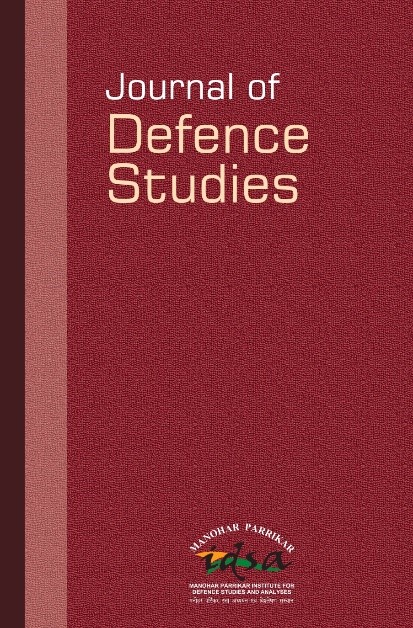You are here
CALL FOR PAPERS

Journal of Defence Studies
Special Issue: India–US Defence Cooperation
Deadline for Manuscript Submission: 1 August 2024
The India–US defence relationship has seen significant growth over the past two decades, and has evolved into a comprehensive global strategic partnership with defence and security cooperation as a cornerstone. With the current Defence Framework Agreement coming up for renewal in 2025, it is an opportune time to assess whether the defence partnership has lived up to its goals over the past two decades, or whether it has been one of unequals.
The trajectory of India–US defence cooperation has been driven by shared concerns over regional security and a mutual commitment to maintain a free and open Indo-Pacific. Key milestones such as the 'Next Steps in Strategic Partnership' and the civil nuclear deal formed the initial stepping stones to enhancing bilateral relations. The signing of foundational defence agreements like Logistics Exchange Memorandum of Agreement (LEMOA), Communications Compatibility and Security Agreement (COMCASA), and Basic Exchange Cooperation Agreement (BECA) have further solidified the strategic partnership, enabling greater interoperability and technology sharing.
The annual ‘2+2 dialogues’, strategic trade authorisations, and joint military exercises have further cemented the defence ties between the two nations. The scope of cooperation has now expanded to encompass diverse domains, including space, cyberspace, maritime domain awareness, cyber issues, Artificial Intelligence (AI), quantum technologies, undersea capabilities, electronic warfare and hypersonic capabilities.
Recent developments such as the Initiative for Critical and Emerging Technologies (iCET) aimed at enhancing technological innovation through defence start-ups, the conclusion of a new Roadmap for US–India Defence Industrial Cooperation, launch of the Advanced Domains Defence Dialogue, and the establishment of the India–U.S. Defense Acceleration Ecosystem (INDUS-X) point to a reinforced defence partnership with a focus on co-development and co-production of defence technologies.
While numerous agreements and frameworks have undoubtedly strengthened the partnership, there are concerns about whether they have translated into tangible progress on the ground, beyond weapons purchases. It is crucial to address potential pitfalls and provide clarity on the ultimate goals of defence cooperation.
Keeping these issues into consideration, the Journal of Defence Studies is planning a special issue on “India–US Defence Cooperation”, and is inviting contributions for the same. Contributors may submit articles/commentaries/opinion pieces covering a range of collaborative areas, including Defence Technology Cooperation, Defence Innovation, Defence Industrial Cooperation and updating the 2015 Defence Framework Agreement to reflect the changing realities.
Topics of Interest
- Understanding the evolution of India–US defence cooperation since the 1962 Sino-Indian War and its impact on current relations.
- Exploring the advancements and challenges in defence technology collaborations, such as the Light Combat Aircraft (LCA) project.
- Analysing the significance of various defence agreements (GSOMIA, LEMOA, COMCASA, BECA, SOSA, RDPA) and their implications for both nations.
- Studying the strategic importance of joint military exercises and their role in enhancing interoperability.
- Examining historical hesitations and their impact on the relationship.
- Addressing technology transfer concerns and their effect on the transfer of defence technology.
- Exploring India's quest for strategic autonomy at the geopolitical and technological strata through the policy of ‘Atmanirbhata’.
|
Submission: Contributors may submit articles/commentaries/opinion pieces to the Associate Editor, Journal of Defence Studies at jds.mpidsa@gov.in latest by 1 August 2024. A full-length analytical article should be in the range of 4,000–8,000 words; the word count range for a perspective/commentary/opinion piece is 2,000–3,000 words. The contributions will be double blind peer-reviewed following the journal’s standard review process, and the honorarium will be paid for selected articles in keeping with our usual practices. Submission Guidelines and more details about the journal are available at https://www.idsa.in/journalofdefencestudies In case of any queries, contact: |
Guidelines for Contributors
JDS Special Issue: India–US Defence Cooperation
Manuscript submission: Articles ranging between 4,000 and 8,000 words and commentaries/perspective pieces of about 2,000–3,000 words may be sent to the Associate Editor, Journal of Defence Studies at jds.mpidsa@gov.in latest by 1 August 2024.
Format
- Manuscripts need to be submitted in MS Word format (2003/2007/newer versions). The text (including notes) should be typed in Times New Roman, 12 pt with 1.5 line spacing and standard margins.
- An abstract of about 100–150 words and 5–6 keywords should be provided in the articles.
- British spellings with ‘s’ variant should be used, i.e., ‘analyse’, ‘organise’, ‘specialisation’, ‘labour’, etc.
- Single quotation marks should be used consistently and use double quotation marks for indicating quoted matter within quotations.
- Tables/Figures/Maps/Images should be numbered sequentially, with appropriate captions, source details and call-outs in the text.
References
All citations/references to others’ works should be clearly mentioned in the notes (footnotes), with a corresponding note cue in the text. The format is mentioned below.
Book: Liang Zhang, Andrew J. Nathan, Perry Link and Orville Schell, The Tiananmen Papers:TheChineseLeadership’s Decisionto Use Force Against theirOwnPeople—In TheirOwnWords, Public Affairs, New York, 2001.
Edited Volume: Ashley Tellis, Mercy Kuo and Andrew Marble (eds), StrategicAsia2008–09: Challengesand Choices, National Bureau of Asian Research, Seattle, 2008.
Chapter in an Edited Volume: T. Jayaraman, Tejal Kanitkar and Mario D’Souza, ‘Equity and Burden Sharing in Emission Scenarios: A Carbon Budget’, in Navroz Dubash (ed.), HandbookofClimate Changeand India:Development,Politicsand Governance, Oxford University Press, New Delhi, 2012, pp. 140–46.
Journal Article: Arthur A. Stein, ‘Coordination and Collaboration: Regimes in an Anarchic World’, International Organization, Vol. 36, No. 2, 1982, pp. 99–114.
Web Reference: Vladimir Radyuhin, ‘INS Vikramaditya Begins Sea Trials’, TheHindu, 8 June 2012, available at http://www.thehindu.com/news/international/article3503982.ece, accessed on 8 June 2012.
